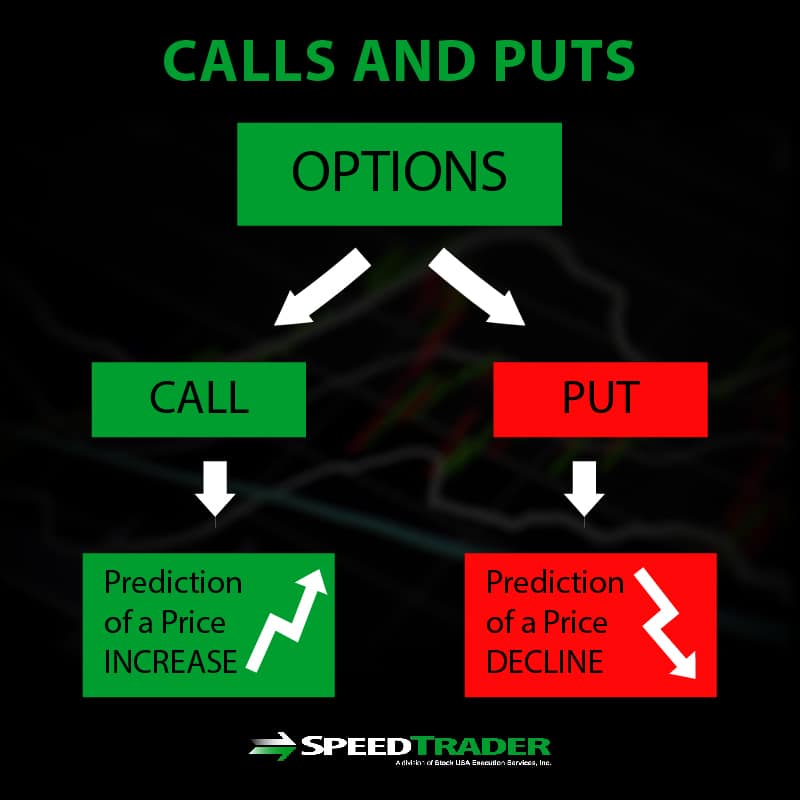Options Trading Definition - Simply put, etf futures and options are derivative instruments tied to exchange traded funds. Call options and put options form. To help you understand the. Options are a type of derivative, which means they derive their value from an underlying asset. In very simple terms options trading involves buying and selling options contracts on the public exchanges and, broadly speaking, it's very similar to stock trading. Examples of derivatives include calls, puts, futures, forwards, swaps, and. This underlying asset can be a stock, a commodity, a currency or a bond. Options are derivatives of financial securities—their value depends on the price of some other asset.
Call options and put options form. Options are derivatives of financial securities—their value depends on the price of some other asset. Simply put, etf futures and options are derivative instruments tied to exchange traded funds. In very simple terms options trading involves buying and selling options contracts on the public exchanges and, broadly speaking, it's very similar to stock trading. To help you understand the. Examples of derivatives include calls, puts, futures, forwards, swaps, and. Options are a type of derivative, which means they derive their value from an underlying asset. This underlying asset can be a stock, a commodity, a currency or a bond.
Call options and put options form. Options are a type of derivative, which means they derive their value from an underlying asset. Examples of derivatives include calls, puts, futures, forwards, swaps, and. Simply put, etf futures and options are derivative instruments tied to exchange traded funds. In very simple terms options trading involves buying and selling options contracts on the public exchanges and, broadly speaking, it's very similar to stock trading. To help you understand the. Options are derivatives of financial securities—their value depends on the price of some other asset. This underlying asset can be a stock, a commodity, a currency or a bond.
What Are Options? Types, Spreads, Example, And Risk Metrics, 44 OFF
Call options and put options form. In very simple terms options trading involves buying and selling options contracts on the public exchanges and, broadly speaking, it's very similar to stock trading. Options are derivatives of financial securities—their value depends on the price of some other asset. Simply put, etf futures and options are derivative instruments tied to exchange traded funds..
What is Options Trading Definition, Types and Strategies
To help you understand the. In very simple terms options trading involves buying and selling options contracts on the public exchanges and, broadly speaking, it's very similar to stock trading. Options are a type of derivative, which means they derive their value from an underlying asset. Options are derivatives of financial securities—their value depends on the price of some other.
Call Options vs. Put Options The Difference
Simply put, etf futures and options are derivative instruments tied to exchange traded funds. This underlying asset can be a stock, a commodity, a currency or a bond. Options are a type of derivative, which means they derive their value from an underlying asset. Call options and put options form. Examples of derivatives include calls, puts, futures, forwards, swaps, and.
Binary Options Trading Definition For Beginners By ForexSQ Infographic
Call options and put options form. In very simple terms options trading involves buying and selling options contracts on the public exchanges and, broadly speaking, it's very similar to stock trading. Examples of derivatives include calls, puts, futures, forwards, swaps, and. To help you understand the. This underlying asset can be a stock, a commodity, a currency or a bond.
What is Options Trading? Definition and Summary AdvisoryHQ
Options are a type of derivative, which means they derive their value from an underlying asset. To help you understand the. Call options and put options form. In very simple terms options trading involves buying and selling options contracts on the public exchanges and, broadly speaking, it's very similar to stock trading. This underlying asset can be a stock, a.
What Is Options Trading And How To Trade Options
Examples of derivatives include calls, puts, futures, forwards, swaps, and. To help you understand the. Options are derivatives of financial securities—their value depends on the price of some other asset. Options are a type of derivative, which means they derive their value from an underlying asset. In very simple terms options trading involves buying and selling options contracts on the.
What Are Options? Types, Spreads, Example, And Risk Metrics, 44 OFF
This underlying asset can be a stock, a commodity, a currency or a bond. Options are a type of derivative, which means they derive their value from an underlying asset. Options are derivatives of financial securities—their value depends on the price of some other asset. Examples of derivatives include calls, puts, futures, forwards, swaps, and. To help you understand the.
Figure out The thing Is Options Trading? kofeta
Options are a type of derivative, which means they derive their value from an underlying asset. In very simple terms options trading involves buying and selling options contracts on the public exchanges and, broadly speaking, it's very similar to stock trading. To help you understand the. Examples of derivatives include calls, puts, futures, forwards, swaps, and. Options are derivatives of.
Options Trading An Introductory Guide for Traders
Options are a type of derivative, which means they derive their value from an underlying asset. Examples of derivatives include calls, puts, futures, forwards, swaps, and. Call options and put options form. This underlying asset can be a stock, a commodity, a currency or a bond. To help you understand the.
Essential Options Guide
Options are derivatives of financial securities—their value depends on the price of some other asset. Call options and put options form. Options are a type of derivative, which means they derive their value from an underlying asset. To help you understand the. Simply put, etf futures and options are derivative instruments tied to exchange traded funds.
Options Are A Type Of Derivative, Which Means They Derive Their Value From An Underlying Asset.
This underlying asset can be a stock, a commodity, a currency or a bond. Examples of derivatives include calls, puts, futures, forwards, swaps, and. Simply put, etf futures and options are derivative instruments tied to exchange traded funds. To help you understand the.
Options Are Derivatives Of Financial Securities—Their Value Depends On The Price Of Some Other Asset.
Call options and put options form. In very simple terms options trading involves buying and selling options contracts on the public exchanges and, broadly speaking, it's very similar to stock trading.
:max_bytes(150000):strip_icc()/Option-fe0c0ee9204c4a50a281e728fb4c7cab.jpg)

:max_bytes(150000):strip_icc()/call-and-put-options-definitions-and-examples-1031124-v5-8566395195f0403aaf5b4ad9e5cc9364.png)



:max_bytes(150000):strip_icc()/StockOption_source-7a5ecb0c22a04d759e283596e7e64905.jpg)


:max_bytes(150000):strip_icc()/OPTIONSBASICSFINALJPEGII-e1c3eb185fe84e29b9788d916beddb47.jpg)